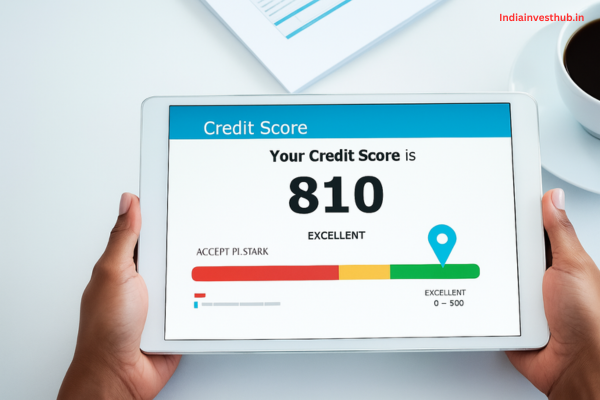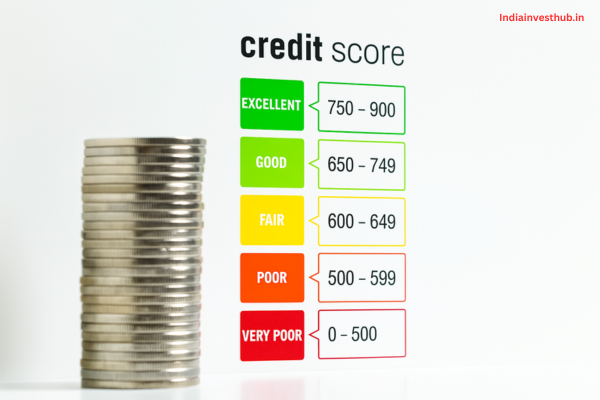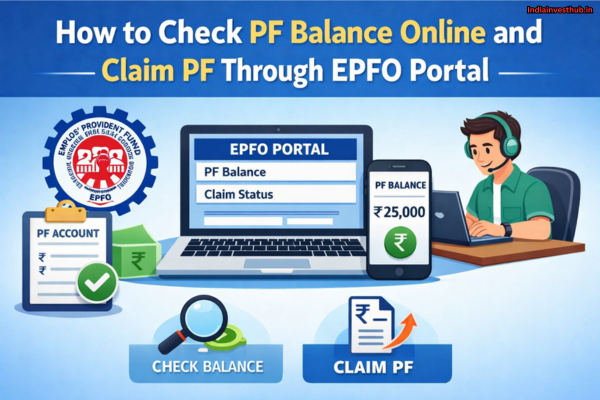Credit Score — it’s a small three-digit number, but for many Indians dreaming of owning their first home, it can decide whether that dream becomes reality or remains just a wish. When Ramesh, a 32-year-old software engineer from Pune, applied for his first home loan, he was confident that his stable income and clean financial record would guarantee approval. But when the bank reviewed his application, his credit score of 610 became the biggest hurdle. Despite a decent salary and job security, his low score led to rejection.
Ramesh’s story isn’t rare — according to a TransUnion CIBIL report (2024), nearly 35% of home loan applications in India are rejected primarily due to poor credit scores. So, the big question most people ask is — Can a low credit score stop you from getting a home loan in India?
Let’s understand this deeply.
Understanding Credit Score and Its Role in Home Loan Approval:

A credit score is a three-digit number ranging from 300 to 900, reflecting your creditworthiness. In India, credit scores are calculated by agencies like CIBIL, Experian, Equifax, and CRIF High Mark. Lenders use this score to evaluate how reliable you are as a borrower. The higher the number, the better your credit profile.
A score of 750 and above is generally considered excellent and significantly increases your chances of loan approval. Banks and NBFCs rely on this score to determine not just approval but also the interest rate, loan amount, and tenure. According to the Reserve Bank of India (RBI), credit scores form a critical part of the risk assessment process in home loan underwriting.
Minimum Credit Score Required for a Home Loan in India:
While there’s no official RBI rule on the minimum score, most major Indian banks follow similar standards. For instance:
- HDFC Bank and ICICI Bank prefer scores above 750.
- SBI accepts applications starting from 700 but may offer higher interest rates.
- Some NBFCs like Bajaj Finserv and Tata Capital may consider applications even with 650, provided there’s strong income proof.
Data from CIBIL (2024) reveals that 79% of approved home loans in India are given to borrowers with credit scores above 750. This clearly shows that while a lower score doesn’t automatically stop you from getting a home loan, it can make the process more difficult, expensive, and limited in choice.
How a Low Credit Score Affects Your Home Loan Eligibility:
A low credit score doesn’t just reduce your chances — it changes the terms of the offer. Borrowers with poor scores may face:
- Higher Interest Rates: Lenders perceive you as risky, so they offset this risk with higher rates.
- Lower Loan Amount: Your eligibility may drop if your repayment history shows defaults or delays.
- Longer Processing Time: Banks often take extra verification steps for low-score applicants.
- Need for a Guarantor or Collateral: Some lenders may demand additional security to approve your loan.
According to BankBazaar (2024), applicants with scores below 650 often receive interest rates 1.5%–2% higher than those with excellent scores. That difference can add up to lakhs over a 20-year loan.
Can You Get a Home Loan with a Low Credit Score?
Yes — but it’s not easy. A low credit score can make the road bumpy, but it doesn’t entirely close the door. Lenders consider several other factors beyond your credit score, such as:
- Income stability
- Employment type (salaried vs. self-employed)
- Existing debts
- Down payment amount
For example, if you have a low score but can make a higher down payment (30–40%), banks might still approve your application. Similarly, joint home loans with a co-applicant who has a strong credit history can increase approval chances. NBFCs and housing finance companies (HFCs) are also more flexible than traditional banks, making them good alternatives for borrowers with weaker scores.
Tips to Improve Your Credit Score Before Applying for a Home Loan:
If your score is currently holding you back, here are proven ways to boost it:
- Pay EMIs and credit card bills on time. Even one missed payment can lower your score.
- Keep your credit utilization ratio below 30%. Don’t max out your credit cards.
- Avoid applying for multiple loans simultaneously. Too many hard inquiries signal desperation.
- Check your CIBIL report regularly. Sometimes, errors in credit reports can harm your score — dispute them immediately.
- Maintain old credit accounts. A longer credit history improves credibility.
As per CIBIL data (2023), consistent on-time payments for just six months can raise a score by 40–70 points — a meaningful difference for loan eligibility.
Alternative Ways to Secure a Home Loan with Poor Credit:
Even with a low credit score, there are practical options to explore:
- Opt for NBFCs or housing finance companies like PNB Housing Finance, LIC Housing, or Indiabulls, which often have relaxed criteria.
- Apply jointly with a co-borrower who has a high score.
- Offer additional security or a guarantor.
- Negotiate with your existing bank. If you have a long relationship with your bank, they may offer lenient terms.
Sometimes, showing strong income documents and stable employment history can outweigh a poor score.
Common Reasons for Low Credit Scores in India:
In India, many people unknowingly damage their credit health due to:
- Late EMI payments or credit card defaults
- High credit card utilization (over 50%)
- Too many personal loans or credit inquiries
- Lack of credit history (a common issue for first-time borrowers)
- Errors in credit reports not being corrected
According to RBI’s Financial Stability Report (2024), over 22% of rejected home loan applicants had “thin” or no credit files, meaning they had never taken credit before — a reminder that even “no score” can affect your loan chances.
Documents and Proofs That Can Strengthen Your Loan Application:
Even with a low score, strong documentation can help you convince lenders. Ensure you provide:
- Income Proof: Salary slips, Form 16, or ITR for the last 3 years.
- Bank Statements: Showing consistent savings and no bounced cheques.
- Employment Proof: A stable job or long business tenure builds trust.
- Property Details: Legal ownership and valuation reports strengthen your case.
If your paperwork is transparent and your income is consistent, lenders may still approve your loan despite a lower score.
How Lenders Assess Risk Beyond Credit Scores:
Lenders today don’t rely solely on your credit number. They use credit behavior analytics, income-to-debt ratios, and employment stability. Many banks also analyze your spending habits and banking activity to estimate financial discipline. For example, a person with a 680 score but steady savings and no major defaults might still be seen as a lower-risk borrower than someone with a 720 score but recent missed payments.
How to Choose the Right Bank for Your Agriculture Loan in India
Myths vs Facts: Home Loans and Credit Scores in India
Myth: A low score means automatic rejection.
Fact: Many NBFCs and HFCs approve loans for scores above 600 with higher interest or collateral.
Myth: Checking your credit score reduces it.
Fact: Only hard inquiries from lenders affect your score. Soft checks by individuals don’t.
Myth: Closing old credit cards improves your score.
Fact: It may actually reduce your score by shortening your credit history.
Understanding these realities can prevent you from taking steps that unknowingly harm your financial credibility.
Expert Recommendations to Increase Approval Chances:
Experts suggest focusing on long-term credit health rather than quick fixes. Financial advisors recommend:
- Keeping credit utilization below 30%.
- Maintaining at least one secured loan (like a car or education loan) to show responsible repayment.
- Avoiding frequent credit applications within short periods.
- Building a diverse credit mix — both secured and unsecured loans.
According to ET Money research (2024), borrowers who maintained stable credit activity and consistent payments for one year improved their loan eligibility by nearly 25%.
Agriculture Loan Approval: What Banks Really Look for in Applicants
FAQs – Low Credit Score and Home Loan Eligibility
Q1: What’s the minimum credit score to get a home loan in India?
👉 Generally, 700 or above is ideal. Some lenders may approve loans for 650–700 with higher rates.
Q2: Will a guarantor help if my score is low?
👉 Yes, adding a co-applicant or guarantor with a strong score significantly improves approval chances.
Q3: How long does it take to improve a low score?
👉 With disciplined payments, it usually takes 6–12 months to see major improvement.
Q4: Can I apply for a home loan without a credit history?
👉 Yes, but your application may undergo more scrutiny. Showing consistent income and assets helps.
Q5: Does paying off all debt instantly boost my score?
👉 It helps, but improvement is gradual. Consistent good behavior matters more than one-time actions.
Conclusion: Should You Apply for a Home Loan with a Low Credit Score?
Applying for a home loan with a low credit score isn’t impossible — but it requires strategy, patience, and preparation. If you urgently need a home, explore NBFCs, co-applicants, or larger down payments. But if time allows, improving your score before applying can save you lakhs in interest and help you secure better terms. Remember, your credit score doesn’t define your financial worth — it reflects your financial habits. Build them wisely, and lenders will follow.
So, before you sign that loan application, ask yourself — is your credit score ready to support your dream home?





